Take a peek into the mind of Cuban virtuoso Kiki Valera, who muses on his influences, his instrument of choice, and the art of making music. Be sure to join us later in February for a live concert with Kiki Valera y su son Cubano (2/25), part of Town Hall’s Global Rhythms series!
Town Hall (TH): Who were your musical influences growing up?
Kiki Valera (KV): I grew up in a musical family, heirs to the legacy of Cuban Son. We used to gather several times a year to celebrate with live music and dance. These were spontaneous reunions and at that time, we were unaware of the role my family was to play in preserving the authenticity of this musical tradition. In 1982, the musicologist Danilo Orozco was conducting an investigation on the origins of Cuban Son in the eastern region of our island and through my paternal grandmother Emilia Miranda, he discovered that he could trace the we played Cuban Son all the way back to the late 19th century. In this musical environment my main influence was the Cuban Son in its purest, simplest form. After that, I began my classical guitar studies at the Esteban Salas Conservatory in the city of Santiago de Cuba, where I had the opportunity to expand and enrich my knowledge from a theoretical point of view.
TH: What do you love most about playing the Cuban cuatro? For those who might be unfamiliar with the instrument, how would you describe its difference from a standard guitar?
KV: What I like the most about the Cuban cuatro is its versatility from a melodic, harmonic and rhythmic point of view. The Cuban cuatro is a mid-sized guitar with eight strings, tuned in pairs of two. It has a distinctive sound that is soft and sparkly and the extra pair of strings (as opposed to the six-stringed Cuban tres) offers me the creative freedom to improvise.
TH: Your roots are in Cuba, but today you’re living, teaching, and making music here in the Pacific Northwest. How does this region inform your music?
KV: Coming from Cuba from a musical environment like that of my family, I have tried to preserve the traditional Cuban music style as authentically as possible. Most artists are unconsciously influenced by other currents, and I am no exception. Being surrounded by a different musical environment than the one I come from, I have really enjoyed playing with excellent musicians of other genres and attending concerts of world music, jazz, Latin jazz, salsa and rock. I can say that I feel lucky to be in the cultural atmosphere of Seattle.
TH: Has the COVID-19 pandemic changed anything about music for you?
KV: For us musicians, interaction with the public is very important. It is a kind of necessary feedback to continue offering the best of ourselves through music. I have used this time to dedicate myself to working on new projects and remote recordings with my musician friends in other parts of the country and world. Musically speaking, COVID-19 has not changed anything in me but I think that it has changed the way we socialize in a general sense and I miss playing live concerts.
TH: What, in your opinion, are the biggest gifts of son Cubano?
KV: The best gift that Cuban Son has given us is that it has allowed us to transmit joy and above all to share with the world our cultural identity.
Cuatro preguntas con Kiki Valera
Eche un vistazo a la mente del virtuoso cubano Kiki Valera, quien reflexiona sobre sus influencias, su instrumento preferido y el arte de hacer música. ¡Asegúrese de unirse a nosotros más tarde en febrero para un concierto en vivo con Kiki Valera y su son Cubano (2/25), parte de la serie Global Rhythms de Town Hall!
Town Hall (TH): ¿Quiénes fueron tus influencias musicales mientras crecías?
Kiki Valera (KV): Crecí en una familia musical, heredera del legado del Son Cubano. Solíamos reunirnos varias veces al año para celebrar en vivo con música y baile. Estas reuniones eran espontaneas y en ese momento, desconocíamos el papel que mi familia iba a jugar en la preservación de la autenticidad de esta tradición musical. En 1982, el musicólogo Danilo Orozco estaba realizando una investigación sobre los orígenes del son cubano en la región oriental de nuestra isla y a través de mi abuela paterna Emilia Miranda, descubrió que podía rastrear el son cubano que interpretábamos hasta finales del siglo XIX. En este ambiente musical mi principal influencia fue el Son Cubano en su forma más pura y simple. Posteriormente inicié mis estudios de guitarra clásica en el Conservatorio Esteban Salas de la ciudad de Santiago de Cuba, donde tuve la oportunidad de ampliar y enriquecer mis conocimientos desde el punto de vista teórico.
TH: ¿Qué es lo que más te gusta de tocar el cuatro cubano? ¿En qué se diferencia de una guitarra estándar?
KV: Lo que más me gusta del cuatro cubano es su versatilidad desde un punto de vista melódico, armónico y rítmico. El cuatro cubano es una guitarra de tamaño mediano con ocho cuerdas, afinada en pares de dos. Tiene un sonido distintivo que es suave y brillante y el par de cuerdas extra (a diferencia del tres cubano de seis cuerdas) me ofrece la libertad creativa para improvisar.
TH: Tus raíces están en Cuba, pero hoy vives, enseñas y haces música aquí en el noroeste del Pacífico. ¿Cómo influye esta región en tu música?
KV: Viniendo de Cuba y de un ambiente musical como el de mi familia, he tratado de preservar el estilo de la música tradicional cubana de la manera más auténtica posible. La mayoría de los artistas están inconscientemente influenciados por otras corrientes y yo no soy una excepción. Al estar rodeado de un ambiente musical diferente al del que vengo, he disfrutado mucho tocando con excelentes músicos de otros géneros y asistiendo a conciertos de world music, jazz, latin jazz, salsa y rock. Puedo decir que me siento afortunado de estar en el ambiente cultural de Seattle.
TH: ¿La pandemia de COVID-19 ha cambiado algo sobre la música para ti?
KV: Para nosotros los músicos, la interacción con el público es muy importante. Es una especie de retroalimentación necesaria para seguir ofreciendo lo mejor de nosotros a través de la música. He aprovechado este tiempo para dedicarme a trabajar en nuevos proyectos y grabaciones remotas con mis amigos músicos en otras partes del país y del mundo. Musicalmente hablando, COVID-19 no ha cambiado nada en mí, pero creo que ha cambiado la forma en que socializamos en sentido general y extraño tocar conciertos en vivo.
TH: A su juicio, ¿cuáles son los mayores dones del son Cubano?
KV: El mejor regalo que nos ha dado el Son Cubano es que nos ha permitido transmitir alegría y sobre todo compartir con el mundo nuestra identidad cultural.


